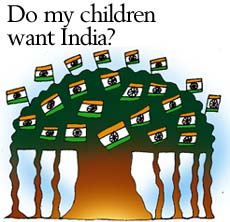 | « Back to article | Print this article |

I missed Ustad Bismillah Khan and Pandit Ravi Shankar because of the traffic jam outside Pragati Maidan. But I was lucky to listen to scores of other fascinating people at the Pravasi Bharatiya Divas, through the day.
Dr Devi Rajab was from South Africa, the dean of student's development at the University of Natal. Though we were meeting for the first time, we freaked out till lunch.
We talked about our kids, whether to wear a sari at the panel discussion later, and what a coincidence it was that her son joined Accenture, a company I had just left. I am in corporate education and she is a dean, so we had plenty of common ground.
A third generation Indian, she was visiting India for the first time. With roots in south India, and married to a north Indian, her personality is totally South African.
But her heart, I found, is still 100 per cent Indian. And for a South African, her perspectives on India were remarkable. It amazed me.
I didn't get the opportunity to 'network' really. I was listening to speeches throughout the day.
Professor Amartya Sen fascinated me. He talked about history. He talked about culture and the evolution of mathematics.
Rajat Gupta of McKinsey, too, spoke well. He said the Indian diaspora is like a banyan tree, its whole greater than the sum total of its parts.
He talked about the mother trunk and the branches, and how together they form a canopy that covers a lot of ground. It struck a chord with me.
I also liked the two gentlemen from the United Kingdom, Lord Bhikhu Parekh and Navneet Dholakia. They were excellent speakers. They spoke on how to build bridges between India and the disapora.
They said the loyalty to the country where you live will not necessarily counter your being Indian or your feelings for India. The best way to be an ambassador of India is to adapt the best from India and give back the best from where you live. That was a strong theme.
In the crowd, I saw the divide between Indians from developed countries and the rest. I heard the panellist from Dubai, Bharat Shah, pointing it out. It was remarkably refreshing. He was so earthy and different.
I think this type of function was long overdue. There is a different kind of message in this conference. It's not 'Come back to India' but 'Stay where you are, let us learn how to use you to improve India'. I think that's good.
I would love to see the next step. But give me specifics: maybe education, maybe outsourcing, maybe improving relations between Indian and American companies by bridging the cultural divide.
Also, we need to involve the next generation. My ties with India are very, very strong. But I am not sure how strong my children's ties are.
They were born in the US, educated there. It would be very nice if organizers could expand such celebrations to include people like them. Because, they are the people who will carry the Indian identity forward.
In the audience today, I saw third or fourth generation Indians, who had come from Fiji and Africa. Amazing! They had no confusion about their Indianness.
But in America I don't see the same kind of ties even in second generation Indians. The sense of Indianness I saw today in the Indians of Malaysia, Mauritius and South Africa, I don't see that in the kids growing up in the US.
I would love to have a panel discussion of youngsters from all over the world. What do they want to do? We can definitely start with the films and music of India. The strongest links are Hindi films. What my kids enjoy most about India is Indian film music and films. It may not be a terribly intellectual thing to start with, but we need to start. We need to tap their emotions.
I have an 18-year-old son and 13-year-old twins. My kids are very westernised. Still, I would like to believe the next generation do need India.
My kids' values are Indian and I am not at all worried about them. They have a balanced mind. They are fun-loving but they have a firm grounding in our values because my husband and I are both Indians. I think they have set certain boundaries for themselves and they have used the Indian attitude to adapt to the Western culture.
But I don't know whether they would like to come back to India, or whether they would like to relate to India or visit it occasionally as we do now. I don't know.
Ranjani Iyenger, a delegate from Chicago at the Pravasi Bharatiya Divas, spoke to Sheela Bhatt.
Illustration: Uttam Ghosh